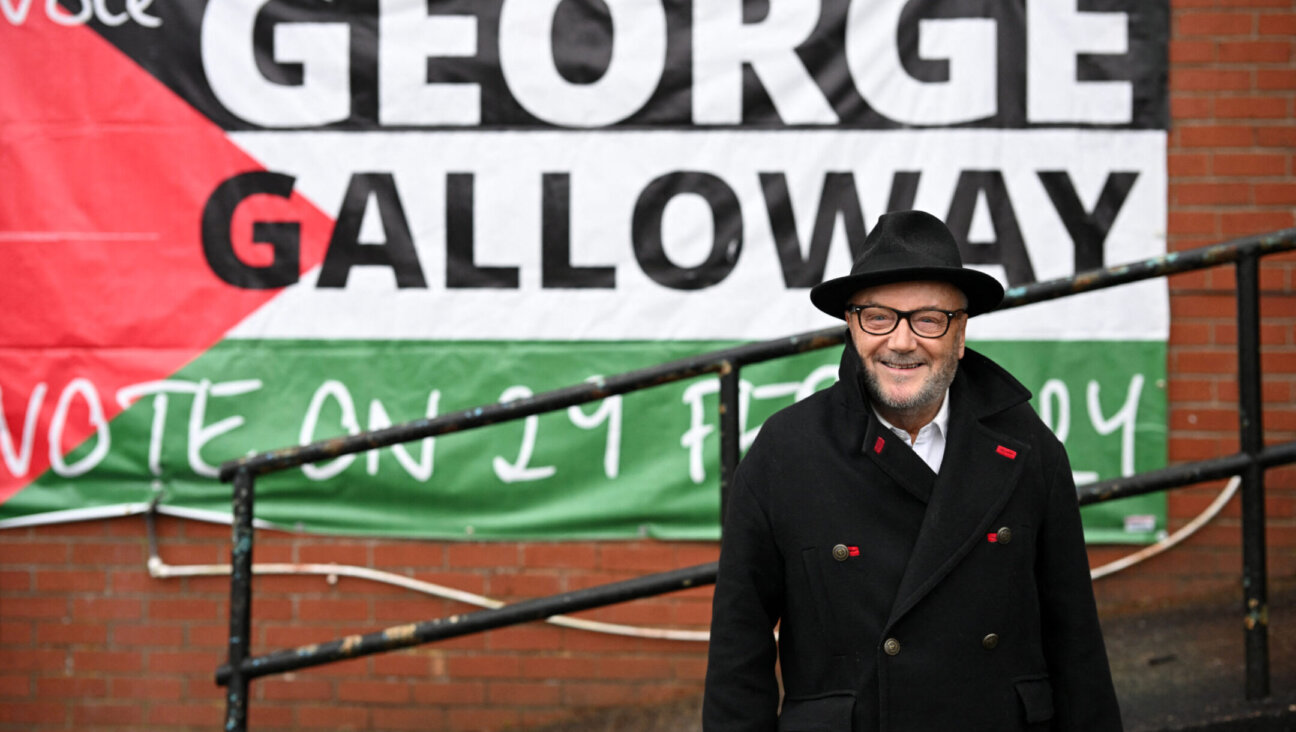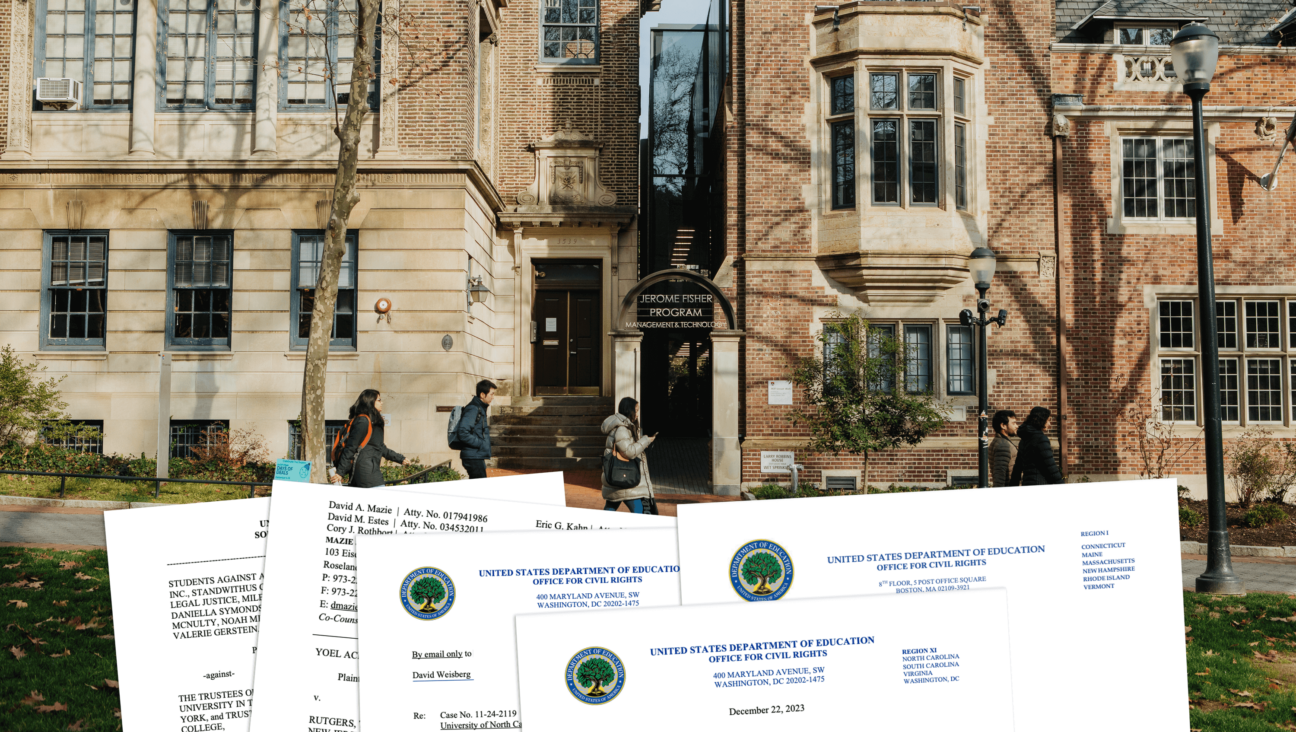A Filmmaker’s Intimate Portrait of ‘Molly Goldberg’

A Fresh View: Aviva Kempner in the window of her Washington home. Kempner?s films tell the stories of unknown Jewish heroes. Image by KEVIN CLARK/THE WASHINGTON POST
Documentary filmmaker Aviva Kempner sat comfortably in a Manhattan editing room, one sandaled foot extended to admire her pedicure. Her bright-red tunic, busy with flowers, matched her red toenails. “I don’t know why more women don’t have their toes done,” she said with a sigh.
That was the extent of the girlish banter. Kempner is soft-spoken yet direct, and she’s got an agenda: On July 10, her fourth documentary, “Yoo-hoo, Mrs. Goldberg,” opens at the Lincoln Plaza Cinema in New York City before appearing in Landmark Theatres nationwide. She also will accept the Freedom of Expression Award at the San Francisco Jewish Film Festival later in July. Until then, she’s got a lot of work to do promoting the film, as well as raising money to finish paying for its production.
“The reason I’m really pushing the film’s release this summer, even though it hasn’t been entirely paid for, is every day I’m losing an audience,” said Kempner, who is a youthful 62 and has a round, inquisitive face and long, dark hair. Her demographic for this project is people of her generation and older who fondly remember the documentary’s main subject.
“Yoo-hoo, Mrs. Goldberg” tells the story of Gertrude Berg, who created, wrote the scripts for and brought the effusive character Molly Goldberg and her fictional family to fame. Kempner won’t be satisfied to lure only the AARP crowd, though. “I want three and four generations to go,” she said emphatically when we talked in early June.

Hello, Neighbor! Gertrude Berg in a still photo from her pioneering television show. Berg won the first best actress Emmy in 1950 for her starring role in ?The Goldbergs.? Image by FAMILY COLLECTION/GOLDBERG
“The greatest joy I had with ‘The Life and Times of Hank Greenberg,’” Kempner said, referring to one of her earlier documentaries on the baseball legend who faced down antisemitism in America’s pastime, “was the grandparents who came out with their children and grandchildren. I’m really looking forward to introducing Gertrude to the younger generations.”
Kempner is so emotionally connected to “Yoo-hoo, Mrs. Goldberg” that she became teary-eyed during the interview. “She really is ‘the most famous woman in America you’ve never heard of,’” Kempner said.
That’s about to change.
For those who need an introduction, “The Rise of the Goldbergs,” began as a radio program in the late 1920s and evolved into “The Goldbergs,” a network television series that aired from 1949 to 1956. In 1950, Berg was awarded the first best actress Emmy and “The Goldbergs” was nominated for best kinescope show.
“She created the domestic sitcom. The greatest shows — ‘The Honeymooners,’ ‘The Lucille Ball Show,’ ‘Friends,’ ‘Seinfeld’ — all owe it to Gertrude Berg for the conceit of being in an apartment building and walking in and out. She developed the model,” Kempner said.
In her 90-minute production, Kempner reveals an intimate portrait of the woman who made Molly Goldberg a welcome friend in the homes of Jews and gentiles alike. Kempner employs feature and archival footage as well as interviews to tell the story of the legendary actress, who died in 1966. Among those interviewed are actor Ed Asner, Supreme Court Justice Ruth Bader Ginsburg and TV producer Norman Lear, as well as members of Berg’s family and the actors she championed.
That Kempner’s film is poignant and often funny even though the backdrop is of a country at war, rampant antisemitism and the shame of blacklisting, attests to this prize-winning documentarian’s skills as a writer, producer and director.
Kempner founded the Ciesla Foundation in 1981. “It’s named in honor of my grandparents and my aunt who died in Auschwitz,” she said, then hesitated for a moment before correcting herself. “They were murdered. ‘Died’ is too nice a word. One uncle survived Auschwitz, and my mother, who had blond hair and green eyes, passed as a Polish Catholic in a German labor camp.”
Kempner was born in Berlin and moved to Detroit with her family in 1950. Her mother, Helen Ciesla Covensky, an abstract expressionist painter whose work was shown at the Detroit Institute of Arts, passed away before seeing “Mrs. Goldberg” completed. When Kempner receives the award in San Francisco she will be surrounded by friends. “Every one of my films is my baby,” she said. “I have four of them.”
That honor, along with a list of other important awards, “means that as an independent filmmaker, I have a certain voice, and I’ve had the freedom to use that voice to tell the stories of unknown Jewish heroes.”
Racking up awards may come easily to Kempner, but funding her projects is a struggle. Filming interviews can run up to $10,000 a day, and archival footage costs thousands, she said. “Yoo-hoo, Mrs. Goldberg” cost nearly $1 million to produce, and she’s still $150,000 shy of the total, so she’s hoping for more donations to her foundation to cover the costs.
“You know the last line of ‘A Streetcar Named Desire’?” Kempner asked. “I depend on the kindness of strangers.”
Tina Barry is a freelance writer who lives in Brooklyn.
A message from our Publisher & CEO Rachel Fishman Feddersen

I hope you appreciated this article. Before you go, I’d like to ask you to please support the Forward’s award-winning, nonprofit journalism during this critical time.
We’ve set a goal to raise $260,000 by December 31. That’s an ambitious goal, but one that will give us the resources we need to invest in the high quality news, opinion, analysis and cultural coverage that isn’t available anywhere else.
If you feel inspired to make an impact, now is the time to give something back. Join us as a member at your most generous level.
— Rachel Fishman Feddersen, Publisher and CEO
























